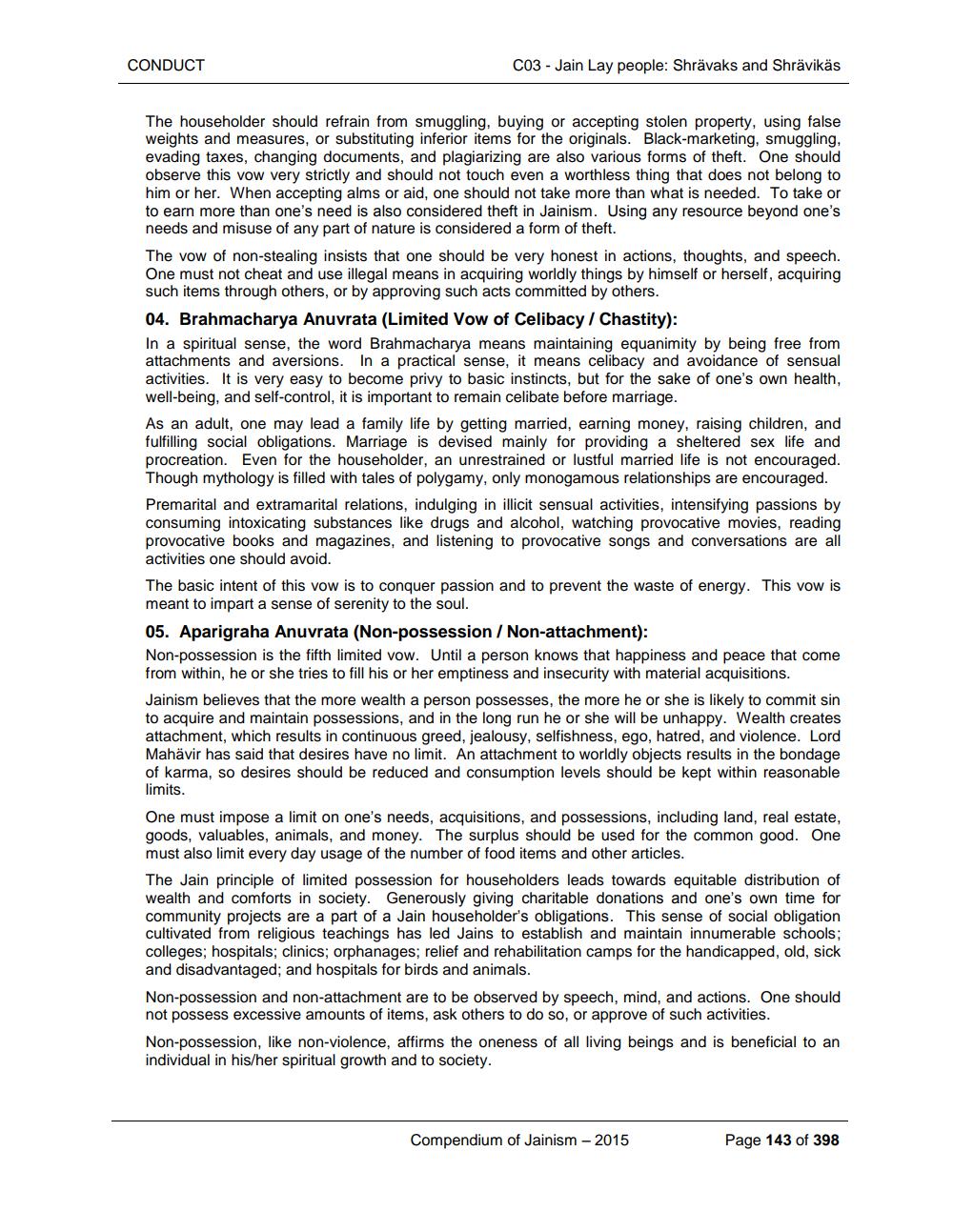________________
CONDUCT
CO3 - Jain Lay people: Shrävaks and Shrävikäs
The householder should refrain from smuggling, buying or accepting stolen property, using false weights and measures, or substituting inferior items for the originals. Black-marketing, smuggling, evading taxes, changing documents, and plagiarizing are also various forms of theft. One should observe this vow very strictly and should not touch even a worthless thing that does not belong to him or her. When accepting alms or aid, one should not take more than what is needed. To take or to earn more than one's need is also considered theft in Jainism. Using any resource beyond one's needs and misuse of any part of nature is considered a form of theft. The vow of non-stealing insists that one should be very honest in actions, thoughts, and speech. One must not cheat and use illegal means in acquiring worldly things by himself or herself, acquiring such items through others, or by approving such acts committed by others. 04. Brahmacharya Anuvrata (Limited Vow of Celibacy / Chastity): In a spiritual sense, the word Brahmacharya means maintaining equanimity by being free from attachments and aversions. In a practical sense, it means celibacy and avoidance of sensual activities. It is very easy to become privy to basic instincts, but for the sake of one's own health, well-being, and self-control, it is important to remain celibate before marriage. As an adult, one may lead a family life by getting married, earning money, raising children, and fulfilling social obligations. Marriage is devised mainly for providing a sheltered sex life and procreation. Even for the householder, an unrestrained or lustful married life is not encouraged. Though mythology is filled with tales of polygamy, only monogamous relationships are encouraged. Premarital and extramarital relations, indulging in illicit sensual activities, intensifying passions by consuming intoxicating substances like drugs and alcohol, watching provocative movies, reading provocative books and magazines, and listening to provocative songs and conversations are all activities one should avoid. The basic intent of this vow is to conquer passion and to prevent the waste of energy. This vow is meant to impart a sense of serenity to the soul. 05. Aparigraha Anuvrata (Non-possession / Non-attachment): Non-possession is the fifth limited vow. Until a person knows that happiness and peace that come from within, he or she tries to fill his or her emptiness and insecurity with material acquisitions. Jainism believes that the more wealth a person possesses, the more he or she is likely to commit sin to acquire and maintain possessions, and in the long run he or she will be unhappy. Wealth creates attachment, which results in continuous greed, jealousy, selfishness, ego, hatred, and violence. Lord Mahävir has said that desires have no limit. An attachment to worldly objects results in the bondage of karma, so desires should be reduced and consumption levels should be kept within reasonable limits.
One must impose a limit on one's needs, acquisitions, and possessions, including land, real estate, goods, valuables, animals, and money. The surplus should be used for the common good. One must also limit every day usage of the number of food items and other articles. The Jain principle of limited possession for householders leads towards equitable distribution of wealth and comforts in society. Generously giving charitable donations and one's own time for community projects are a part of a Jain householder's obligations. This sense of social obligation cultivated from religious teachings has led Jains to establish and maintain innumerable schools; colleges; hospitals; clinics; orphanages; relief and rehabilitation camps for the handicapped, old, sick and disadvantaged; and hospitals for birds and animals. Non-possession and non-attachment are to be observed by speech, mind, and actions. One should not possess excessive amounts of items, ask others to do so, or approve of such activities. Non-possession, like non-violence, affirms the oneness of all living beings and is beneficial to an individual in his/her spiritual growth and to society.
Compendium of Jainism - 2015
Page 143 of 398




